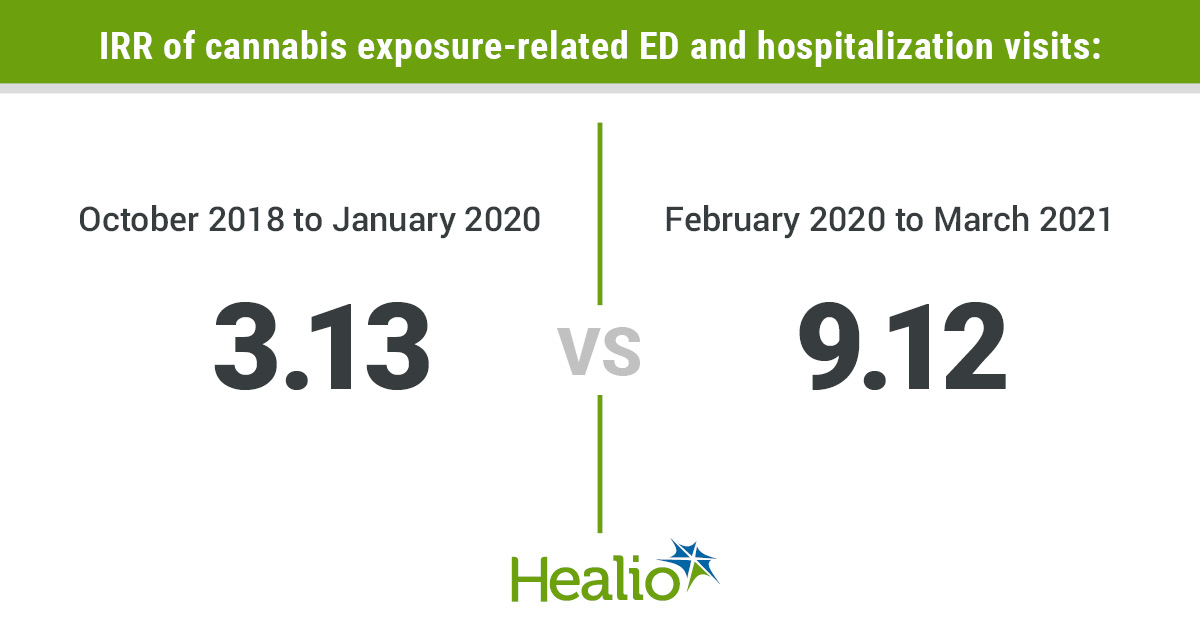You are here
Home 🌿 Medical Cannabis News 🌿 Pediatric ED visits for cannabis exposure significantly increased after legalization 🌿Pediatric ED visits for cannabis exposure significantly increased after legalization

In Canada, pediatric ED visits due to cannabis exposure significantly increased after recreational cannabis was legalized, according to recent data. The website for the government of Canada states that the country legalized sales of fresh cannabis, dried cannabis, cannabis oil, cannabis seeds and cannabis plants in 2018. One year later, the sale of edible cannabis products, cannabis extracts and cannabis topicals was also legalized.
Daniel T. Myran, MD, MPH, a family physician and health services researcher within the clinical epidemiology program at the Ottawa Hospital Research Institute, and colleagues analyzed 81 cannabis exposure-related ED visits and hospitalizations prior to legalization (January 2016 to September 2018). They compared the prevalence of the visits with 124 cannabis exposure visits after the legalization of cannabis flower products (October 2018 to January 2020) and 317 visits after the legalization of commercial edibles, which also overlapped with the first year of the COVID-19 pandemic (February 2020 to March 2021). The patients either presented to the ED or were hospitalized in Ontario, Canada. Their mean age was 3.8 years, and 53.8% were boys.
The researchers reported in JAMA Network Open that, compared with the pre-legalization period, the incidence rate ratio [IRR] of cannabis exposure-related ED visits and hospitalizations was 3.13 (95% CI, 2.37-4.16) in October 2018 to January 2020 and 9.12 (95% CI, 7.15-11.65) in February 2020 to March 2021. After adjusting for an increasing time trend in ED visits caused by cannabis exposures throughout the study period, the increase in visits remained significantly higher in February 2020 to March 2021 (IRR = 2.23; 95% CI, 1.17-4.27).
Throughout the study period, 3.6% of the cannabis exposure-related ED visits and hospitalizations required an ICU admission; no deaths were recorded. The researchers also reported that their findings were sevenfold higher than rates reported in Colorado, where recreational cannabis sales were legalized in 2012 and began in 2014.
“Our study was limited by lack of data on the source and type of cannabis ingested, and it is possible that cannabis from illicit sources and nonedible products contributed to the increase in visits,” Myran and colleagues wrote.
“Further regulatory measures, such as limiting formulations and appearance of commercial edibles, combined with education for parents and caregivers, may be required to decrease pediatric cannabis exposures.”
420 Intel is Your Source for Marijuana News
420 Intel Canada is your leading news source for the Canadian cannabis industry. Get the latest updates on Canadian cannabis stocks and developments on how Canada continues to be a major player in the worldwide recreational and medical cannabis industry.
420 Intel Canada is the Canadian Industry news outlet that will keep you updated on how these Canadian developments in recreational and medical marijuana will impact the country and the world. Our commitment is to bring you the most important cannabis news stories from across Canada every day of the week.
Marijuana industry news is a constant endeavor with new developments each day. For marijuana news across the True North, 420 Intel Canada promises to bring you quality, Canadian, cannabis industry news.
You can get 420 Intel news delivered directly to your inbox by signing up for our daily marijuana news, ensuring you’re always kept up to date on the ever-changing cannabis industry. To stay even better informed about marijuana legalization news follow us on Twitter, Facebook and LinkedIn.




